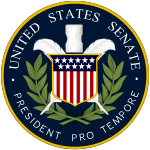Willard Saulsbury Jr.
| Willard Saulsbury Jr. | |
|---|---|
 | |
| United States Senator from Delaware | |
|
In office March 4, 1913 – March 4, 1919 | |
| Preceded by | Harry A. Richardson |
| Succeeded by | L. Heisler Ball |
| President pro tempore of the U.S. Senate | |
|
In office December 14, 1916 – March 4, 1919 | |
| Preceded by | James Paul Clarke |
| Succeeded by | Albert B. Cummins |
| Personal details | |
| Born |
April 17, 1861 Georgetown, Delaware |
| Died |
February 20, 1927 (aged 65) Wilmington, Delaware |
| Political party | Democratic |
| Spouse(s) | May du Pont |
| Residence | Wilmington, Delaware |
| Alma mater | University of Virginia |
| Profession | Lawyer |
| Religion | Episcopalian |
Willard Saulsbury Jr. (April 17, 1861 – February 20, 1927) was an American lawyer and politician from Wilmington, in New Castle County, Delaware. He was a member of the Democratic Party who served as U.S. Senator from Delaware and President pro tempore of the U.S. Senate.
Early life and family
Saulsbury was born in Georgetown, Delaware, son of Willard Saulsbury, Sr., and nephew of Gove Saulsbury and Eli M. Saulsbury. He attended private schools and the University of Virginia at Charlottesville, where he was a member of St. Anthony Hall. Subsequently he studied law, was admitted to the Bar in 1882, and commenced practice in Wilmington, Delaware.
He was president of the New Castle Bar Association and chairman of the board of censors.
Political career
Saulsbury was a member of the Democratic National Committee from 1908 until 1920, and was an unsuccessful Democratic candidate for U.S. Senator nearly every year, beginning in 1899.
He was elected to the U.S. Senate in 1913, the first year that the position was filled by an election rather than by the General Assembly. During this term, he served with the Democratic majority in the 63rd, 64th, and 65th Congresses from March 4, 1913, until March 4, 1919. He was the President pro tempore of the Senate during the 64th and 65th Congress. In the 63rd, 64th, and 65th Congress he was Chairman of the Committee on Coast and Insular Survey, and in the 65th Congress he was also a member of the Committee on Pacific Islands and Puerto Rico. In 1918, he lost to Republican L. Heisler Ball, a former U.S. Senator.
Later years
After leaving the Senate, he was a member of the advisory committee of the Conference on Limitation of Armaments in Washington, D.C., in 1921 and 1922, and a member of the Pan American Conference in Santiago, Chile, in 1923.
He continued the practice of law in Wilmington and Washington, D.C., until his death.
Saulsbury died in Wilmington and is buried in the Christ Episcopal Church Cemetery at Dover.
| Public Offices | ||||||
|---|---|---|---|---|---|---|
| Office | Type | Location | Began office | Ended office | notes | |
| U.S. Senator | Legislature | Washington | March 4, 1913 | March 3, 1919 | ||
| United States Congressional service | ||||||
|---|---|---|---|---|---|---|
| Dates | Congress | Chamber | Majority | President | Committees | Class/District |
| 1913–1915 | 63rd | U.S. Senate | Democratic | Woodrow Wilson | class 2 | |
| 1915–1917 | 64th | U.S. Senate | Democratic | Woodrow Wilson | class 2 | |
| 1917–1919 | 65th | U.S. Senate | Democratic | Woodrow Wilson | class 2 | |
| Election results | |||||||||||
|---|---|---|---|---|---|---|---|---|---|---|---|
| Year | Office | Subject | Party | Votes | % | Opponent | Party | Votes | % | ||
| 1918 | U.S. Senator | Willard Saulsbury Jr. | Democratic | 20,113 | 48% | L. Heisler Ball | Republican | 21,519 | 51% | ||
References
- Franseth, Gregory S; L. Rebecca Johnson Melvin & Shiela Pardee (2003). "The End of an Era in Delaware: The Practical Politics of Willard Saulsbury Jr.". University Delaware Library Associates. XI.
- Munroe, John A. (1993). History of Delaware. Newark, Delaware: University of Delaware Press. ISBN 0-87413-493-5.
External links
- Biographical Directory of the United States
- Delaware’s Members of Congress
- Find a Grave
- The Political Graveyard
| United States Senate | ||
|---|---|---|
| Preceded by Harry A. Richardson |
U.S. Senator (Class 2) from Delaware 1913-1919 |
Succeeded by L. Heisler Ball |

